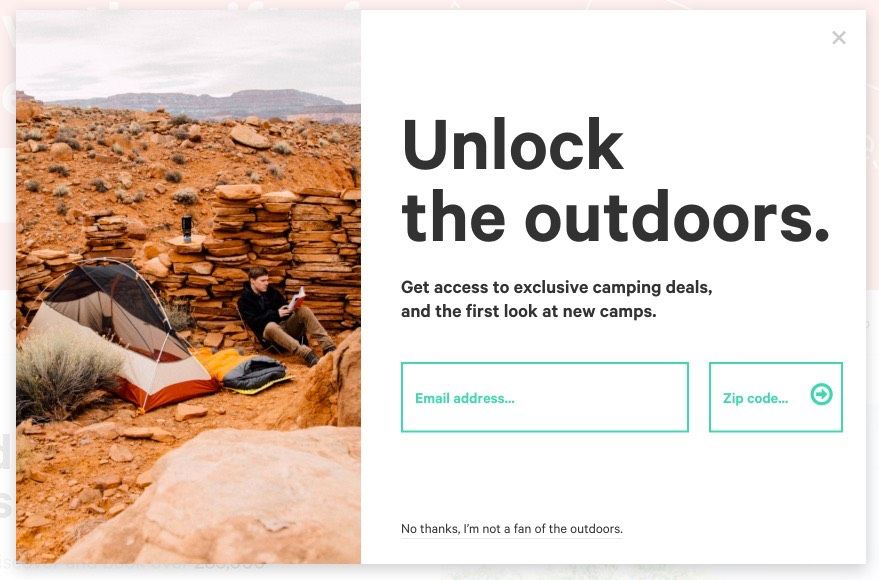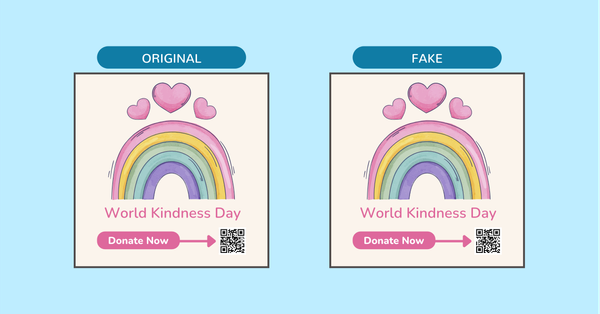Many of us have come to despise them: the intrusive, unsolicited subscription forms promising you the holy grail of insights and knowledge. But the imaginative rudeness of how companies push people into signing up has grown into a competition delving into extreme depths of disrespect. I can safely say that ethical boundaries were crossed a long time ago.
Let’s look at an example that’s not even trying to sell you something:

Hipcamp have managed to attract an outdoors fan to their website, they throw up a subscription form while browsing other content and the only way for that person to not sign up, and close the window, is to click a link that reads: ”No thanks, I’m not a fan of the outdoors”.
If the blatant insult isn’t clear enough allow me to visualize with a metaphor. You walk into an outdoors shop because you are going hiking next week, one of your favorite activities. As you are looking at a pair of boots the shopkeeper asks if they can send you their marketing e-mail once a week. But the only way to decline is for you to briefly stand in the changing room with a sign around your neck bearing the words ”I don’t like the outdoors.”
Sure, nobody else can see you wearing the sign. No one except you, looking at your own reflection. How likely are you to shop at that store again?
After criticism Hipcamp changed the link to only read ”No, thanks.”, although it’s still tucked away in small type at the bottom. But what concerns me is that these techniques, popularly known as confirmshaming, are snowballing and not a week goes by without a new one literally popping up. Real people are sitting in real meetings and deciding that confirmshaming is a good idea for their organization.
— We need more people to sign up for our newsletter.
— How about if we insult the people visiting our site?
— How do you mean?
— Well, we make sure that the link to not subscribe is something personally offensive, so that they won’t want to click that, and then instead the only thing they can do is subscribe.
— Excellent, let’s run with that.
Not only is a poor lack of judgment and offensive behavior on display here. An organization adopting this tactic is revealing to the world how short-sighted and clueless they are when it comes to business strategy. There is also a disconcerting air of desperation in the whole ordeal: Not only do we want subscribers, but we’ll even risk insulting the potential subscribers, because short term conversion is more important than the person we actually built the service for in the first place. If some vulnerable people get hurt in the process, so be it.
My personal conclusion when I see this behavior on display is that it’s obviously an organization I do not want a relationship with. I prefer to choose my friends wisely.
That’s also why I did not buy this book about dog training from “Chet”. To opt out of buying the book, the sales team want me to click a link that includes the text: “I’m content to never help my dog become as confident and happy in social settings as he can be.” Also, Chet, my dog is a she.

Here’s what happens when companies engage in confirmshaming:
- Organizations reveal how they truly feel about their users and customers.
- Organizations reveal how short-sighted they are.
- Trust is diminished.
- Reputation is damaged.
- Vulnerable people risk feeling truly bad about themselves.
Why is confirmshaming so popular then? Well, one theory is that it works for the single, short-sighted outcome that the organization may be shooting for: a higher conversion rate for subscriptions. I have personally not seen evidence that supports this in practice (mainly because I’m not remotely interested in insulting people), but I’m confident that it works in specific contexts. Sadly I also believe that it often happens without organizations even looking for evidence… they’re just “trying it out” without the slightest concern for ethical thinking.
So could it possibly work to increase conversions in the short term? Perhaps. Does confirmshaming boost profit in the long run? My bet is on NO. Which is exactly why I will not put energy into that relationship; The organization has a lot of internal issues to work out first. Or they have actively decided to be a short term company. In which case I will do my bit to help them make that short term come true sooner rather than later.
Here’s a 3-step guide to dealing with confirmshaming if you are ever a target:
- Close the whole browser window/tab completely, ensuring you do not have to click the shaming text.
- Tell the company how you feel by mentioning them on Twitter with the hashtag #confirmshaming. If that’s not possible e-mail them (which unfortunately will have you going back to the website briefly).
- Do not return to the website until you hear back that they have decided to do better.
A fourth step, if you wish, may be telling me about it. I collect these examples and really appreciate when people send me more. I’d love to see ones in other languages than English as well.
Stay safe and don’t let subscription forms tell you how you think or what you like.









Member discussion